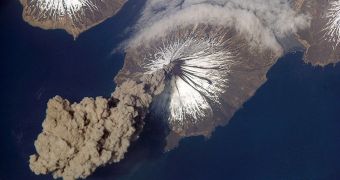A paper published in the January 31 issue of the esteemed scientific journal Geophysical Research Letters proposes that the Little Ice Age – a global cooling that occurred at the end of the 13th century, and lasted for about a century – was caused by volcanic eruptions.
The event was also supported by extended amounts of sea ice, which further prevented temperatures from rising. This diminutive ice age lasted for about three centuries, before everything returned to normal. Researchers have been puzzling over why this cooling effect occurred for a long time.
In the new investigation, researchers at the University of Colorado in Boulder (UCB) looked at a wide array of clues as to what happened. They analyzed chemicals stored in Arctic vegetation, hoping that the data will clear some of the mysteries associated with the pseudo-global cooling event.
During the Little Ice Age, northern glaciers advanced over significant parts of Europe, going as far as to freeze water canals in the Netherlands (which now benefits from a relatively warm climate), as well as the river Thames that passes through London, England.
Certain pieces of evidence also appear to suggest that the climate event affected other continents as well. “This is the first time anyone has clearly identified the specific onset of the cold times marking the start of the Little Ice Age,” UCB geological sciences professor Gifford Miller explains.
“We also have provided an understandable climate feedback system that explains how this cold period could be sustained for a long period of time,” adds the expert, who was also the lead researcher on the new investigation.
He explains that the main culprits for the Little Ice Age were volcanoes in tropical regions, which erupted heavily for prolonged periods of time. The aerosols they released in the atmosphere reflected solar radiation back into space, contributing to cooling the planet, and promoting ice formation.
The North Atlantic sea-ice mixing also played a role in the event, the team believes. This region of the ocean is very susceptible to influences from Arctic ices, which can easily disrupt the normal mixing between surface and deeper waters.
This process is essential to generating the heat that then spread over Europe, heating the continent. When the water mixing falters, cold spells always come over Europe, sometimes for prolonged periods of time. The UCB investigators believe this is what happened during the Little Ice Age as well, Space reports.

 14 DAY TRIAL //
14 DAY TRIAL //